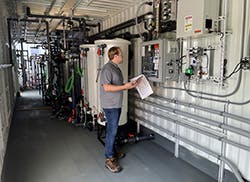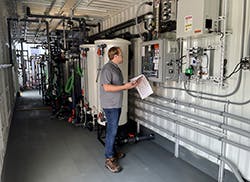New Mobile Technology Removes PFAS From Water
Arcadis technology removes 99% of targeted PFAS.
Arcadis, in partnership with Evocra, launches its commercially available, portable fractionation pilot system, a mobile technology that separates contaminants like poly- and perfluoroalkyl substances (PFAS) from water. Deployment of the technology has consistently resulted in 99% removal of targeted PFAS, according to the company.
In pursuit of more agile and effective solutions to protect the environment from PFAS, Arcadis’ 53-foot portable system allows users to apply the technology to complex waste streams before committing to dedicated on- or off-site treatment facilities. The system reportedly reduces maintenance requirements associated with larger-scale installations and is flexible enough to treat a wide variety of contaminants ranging from landfill leachate to heavy metals. Designed in accordance with North American power and construction standards and built in the U.S., the system treats up to 10 gallons per minute, according to Arcadis.
In addition to removing up to 99% of PFAS from water, the technology can reportedly decrease the volume of contaminant-impacted waste streams by up to 99.5%. While highly effective, membrane exclusion and filtration technologies require carbon and resin to capture contaminants and produce secondary waste that can be costly to manage. Micron-sized gas bubbles of air and ozone drive Arcadis’ fractionation system’s efficiency, removing PFAS while reducing waste volume. This reduces consumption of adsorption media and ultimately decreases overall remediation costs.
“Innovative technologies that remove PFAS while also significantly reducing secondary waste are a win-win for the environment and for our clients,” says Brooke Bonkoski, president of Arcadis’ environment business in the U.S. “Portable ozone fractionation is a major step forward in simplifying how our clients manage these chemicals and for protecting the ecosystems and waterways we all depend on.”
PFAS are a group of emerging contaminants with unique chemical features that have been used in technical and consumer products for their oil, water and heat resistant properties for decades. Concerns around the human health impacts of PFAS have substantially increased awareness and scrutiny of the chemicals and regulatory agencies around the world are setting limits and casting wider regulatory nets to mitigate, treat and manage PFAS.
The technology represents the culmination of a two-year effort with Evocra to pilot ozone fractionation with Arcadis’ North American clients. Industrial facilities interested in conducting pilots should contact Corey Theriault, P.E. at [email protected].
For more information, visit: www.arcadis.com

